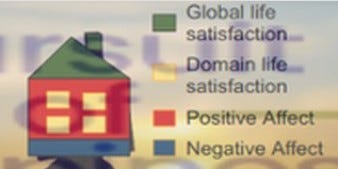What Do You Actually Want When Wanting Happiness?
- How is happiness defined and what does it consist of?
We all want happiness, it is just so natural.
But have you ever thought of what it means? What’s in happiness that you want?
Is it the pleasant feelings when getting something you need, or the excitement when achieving something you have worked so hard for?
Is it not having any suffering or sadness?
Is it recognizing that you have a good life? Or a good marriage, good job, and your kids if any all turns out fine?
Or is it all the above? And,
Does it depend on how others see you or your life as?
The legendary Dr. Ed Diener, for decades a world leading researcher of happiness, answered all these for us in his Subjective Well-being concept of happiness, based on an abundance of research on this topic and extensive data analyses.
This concept firstly recognizes that happiness is a subjective feeling; - It is how well you yourself feel, and judge, your life being. Therefore, happiness is now scientifically defined as Subjective Well-being, literarily meaning you subjectively evaluate your life as being well.
This means, only you truly know whether you are happy or not. This also implies that when you judge others’ happiness, or others judge yours, it could be quite off.
A major contribution of the Subjective Well-being concept to the science of happiness is in its differentiation of the different components of happiness, in two main categories: One’s “cognitive evaluations” about their own life, and their “affective (feeling/emotion) evaluations”.
See a more detailed description of all these in this short video.
The “cognitive evaluation” category is about our “judgement” on how well our life is. That is when you figure, “If I think about it, my life is… , or, my job (marriage, living condition, etc.) is….)”. In a phrase, that is Life Satisfaction; further differentiated into Global Life Satisfaction (concerning your life as a whole), and Domain Life Satisfaction (concerning different aspects of your life).
The “affective evaluation” category is about our feelings, that is how we feel living in our life. Feelings could be positive or negative, so this category is further separated into two components: Positive affect (positive feelings or emotions), and Negative Affect (negative feelings or emotions).
As a component of happiness, Negative Affect serves as a counter force. Including it in this concept of happiness reflects a scientifically established fact that being happy is not just getting rid of negative feelings, nor we even need to get rid of all negative feelings; happiness can co-exist with negative feelings, with the latter’s effects being separately considered in our evaluations of happiness.
So back to the list of questions we had at the beginning of this article. Yes, to
Is it the pleasant feelings when getting something you need, or the excitement when achieving something you have worked so hard for?
and
Is it recognizing that you have a good life? Or a good marriage, good job, and your kids if any all turns out fine?
But not completely for:
Is it not having any suffering or sadness?
We do not need to get rid of all sadness to have happiness, in fact, we might need a low “dose” of negative emotions for our well-being).
and no to:
Does it depend on how others see you or your life as?
Why? Because happiness is by nature subjective and an internal feeling.
Others’ opinions may affect you, but only through your internal processing.
“Happiness” derived from how others see you as is superficial and short-lived.
So, when you think showing off your possessions to your neighbors can bring you happy feelings, you may be looking at the wrong place.
This construct of Subjective Well-being thus maps out the four components of happiness: Global Life Satisfaction, Domain Life Satisfaction, Positive Affect, and (a low level of) Negative Affect. This not only provides a framework for researchers in the field to quantify and study happiness, but it also helps us outside of research to target the different components in building our own happiness. Therefore, I called them “happiness building blocks”.
Join in our discussions on how to use these “building blocks” for Building our Happiness!




